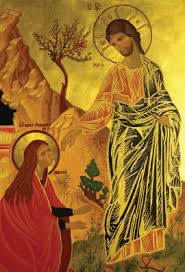We have to get one word explained and out of the way. Eschatological means the things at the end – death, judgement and eternal life.
One preacher, in an interesting look at the Easter Sunday meeting of Mary and the risen Lord, preaches the event as an eschatological confrontation with grace. That confrontation always produces “new life because that is what the Gospel is – God in Christ making all things new. In a rather beautiful chain of statements the preacher brings us to see that when Mary stood in that garden wondering where they had taken her Lord, she died. There was nothing more that she could do for God if there had ever been. She was born from above by a proclamation. “The proclaimed Word then translated her to the truly spiritual kingdom by the outrageous divine promise: “I am pleased with you, on account of Christ.” Jesus said, “My sheep know my voice,” thereby establishing a new relationship that “constitutes” who Mary “is” (or you now “are”) having heard the living Word of the crucified and resurrected Jesus Christ as forgiveness of sins for you. This new situation in relation to Christ determines our reading of Scripture by making the proper distinction between a letter that kills and the Spirit who gives life. This eschatological distinction is made by hearing the Word ( fides ex auditu )— we receive or suffer it, and so all things are made new— even our own selves in faith itself that clings to Christ’s words like a drop of water clinging to a pitcher.”[1]
[1] Steven Paulson in “Justification is for Preaching”.


